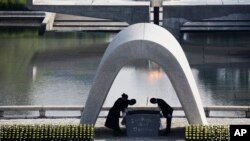ໃນວັນອາທິດມື້ນີ້ ຍີ່ປຸ່ນ ໄດ້ລະນຶກເຖິງວັນຄົບຮອບ 72 ປີ ຂອງການຖິ້ມລະເບີດນິວ
ເຄລຍ ສະຫະລັດ ໃສ່ເມືອງ Hiroshima ທີ່ໄດ້ນຳໄປສູ່ການອາວະສານຂອງສົງຄາມ
ໂລກຄັ້ງທີສອງ.
ນາຍົກລັດຖະມົນຕີ ຍີ່ປຸ່ນ ທ່ານ Shizo Abe ໄດ້ກ່າວໃນພິທີປະຈຳປີທີ່ສວນອະນຸສາ
ວະລີສັນຕິພາບ ໃນເມືອງ Hiroshima ໃກ້ໆກັບຈຸດໃຈກາງຂອງລະເບີດວ່າ “ເພື່ອ
ພວກເຮົາຈະສືບຕໍ່ໃນໂລກນີ້ຕໍ່ໄປໂດຍປາສະຈາກອາວຸດນິວເຄລຍນັ້ນ, ພວກເຮົາ
ຕ້ອງການການຮ່ວມມືຈາກທັງປະເທດທີ່ມີອາວຸດນິວເຄລຍ ແລະ ປະເທດທີ່ບໍ່ມີ.”
ເຈົ້າຄອງເມືອງ Hiroshima ທ່ານ Kazumi Matsui ກ່າວວ່າ “ຕາບໃດທີ່ອາວຸດນິວ
ເຄລຍຍັງມີຢູ່ ແລະ ບັນດາຜູ້ກຳນົດນະໂຍບາຍຂອງປະເທດຍັງສືບຕໍ່ຂົ່ມຂູ່ທີ່ຈະໃຊ້ມັນ,
ຄວາມເປັນຕາຢ້ານຂອງມັນອາດເຄື່ອນເຂົ້າມາໃນຊີວິດຂອງພວກເຮົາໃນເວລາໃດກໍ
ໄດ້. ເຈົ້າອາດຈະໄດ້ພົບວ່າ ຕົນເອງກຳລັງທຸກທໍລະມານກັບຄວາມໂຫດຮ້າຍນັ້ນຊໍ່າ
ໃດ.”
ການຖິ້ມລະເບີດໃສ່ເມືອງ Hiroshima ໄດ້ສັງຫານປະຊາຊົນປະມານ 140,000 ຄົນ
ໃນທັນທີທັນໃດ ຫຼືບໍ່ ກໍຈາກການເຜົາໄໝ້ ຈາກກຳມັນຕະພາບລັງສີ ລຸນຫຼັງລະເບີດແຕກ.
ລະເບີດອີກລູກໜຶ່ງ ໄດ້ຖືກຖິ້ມໃສ່ເມືອງທ່າເຮືອ Nagasaki ສາມວັນຕໍ່ມາ, ສັງຫານປະ
ຊາຊົນປະມານ 70,000 ຄົນ.
ວໍຊິງຕັນ ໄດ້ໂຕ້ແຍ້ງວ່າ ການໂຈມຕີແມ່ນຄວາມຈຳເປັນທີ່ຈະເຮັດໃຫ້ສົງຄາມສິ້ນສຸດ
ລົງໄວຍິ່ງຂຶ້ນ. 6 ມື້ຫຼັງຈາກການໂຈມຕີເມືອງ Nagasaki, ຍີ່ປຸ່ນ ໄດ້ຍອມແພ້ ແລະ
ເຮັດໃຫ້ສົງຄາມສິ້ນສຸດລົງ.
ເລຂາທິການໃຫຍ່ອົງການສະຫະປະຊາຊາດທ່ານ Antonio Guterres ໄດ້ກ່າວໃນຂໍ້
ຄວາມທີ່ຂຽນເຖິງເມືອງ Hiroshima ວ່າ “ຄວາມຝັນ ກ່ຽວກັບ ໂລກທີ່ປອດອາວຸດນິວ
ເຄລຍຂອງພວກເຮົາຍັງຄົງໄກຈາກຄວາມເປັນຈິງຢູ່.” “ປະເທດທີ່ມີອາວຸດນິວເຄລຍໃນຄອບຄອງ ມີຄວາມຮັບຜິດຊອບເປັນພິເສດ ທີ່ຈະເອົາບາດກ້າວອັນໜັກແໜ້ນ ແລະ
ປ່ຽນແປງບໍ່ໄດ້ໃນການປົດອາວຸດນິວເຄລຍ.”
ອົງການສະຫະປະຊາຊາດໄດ້ຮັບຮອງເອົາສົນທິສັນຍາ ຫ້າມອາວຸດນິວເຄລຍໃນເດືອນ
ກໍລະກົດທີ່ຜ່ານມາ, ແຕ່ປະເທດມະຫາອຳນາດນິວເຄລຍ 9 ປະເທດໄດ້ຕໍ່ຕ້ານຂະບວນ
ການດັ່ງກ່າວ. ບັນດານັກວິຈານກ່ຽວກັບ ສົນທິສັນຍາໄດ້ເວົ້າວ່າ ມັນໄດ້ມອງຂ້າມໄພຂົ່ມ
ຂູ່ ຕໍ່ຄວາມປອດໄພໃນຊີວິດຕົວຈິງ, ເຊັ່ນ ເກົາຫຼີເໜືອນັ້ນ.
Japan on Sunday marked the 72nd anniversary of the U.S. nuclear bombing of Hiroshima that led to the end of World War Two.
"For us to truly pursue a world without nuclear weapons, we need participation from both nuclear-weapons and non-nuclear weapons states," Japanese Prime Minister Shinzo Abe said at the annual ceremony at Hiroshima Peace Memorial Park near the bomb's epicenter.
Hiroshima Mayor Kazumi Matsui said, "As long as nuclear weapons exist and policymakers threaten their use, their horror could leap into our present at any moment.You could find yourself suffering their cruelty."
The Hiroshima bombing killed around 140,000 people either instantly or from radiation burns in the immediate aftermath.
Another bomb was dropped on the port city of Nagasaki three days later, killing an estimated 70,000 residents.
Washington argued the attacks were necessary to bring about a quicker end to the war.Six days after the Nagasaki attack, Japan surrendered, ending the war.
"Yet our dream of a world free of nuclear weapons remains far from reality," U.N. Secretary General Antonio Guterres said in a message to Hiroshima. "The states possessing nuclear weapons have a special responsibility to undertake concrete and irreversible steps in nuclear disarmament."
The U.N. adopted an international treaty banning nuclear weapons in July, but the world's nine nuclear powers boycotted the proceedings.Critics of the treaty said it ignored the real-life security threats, such as North Korea.





